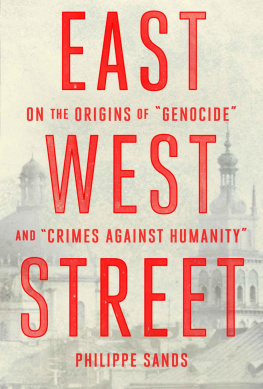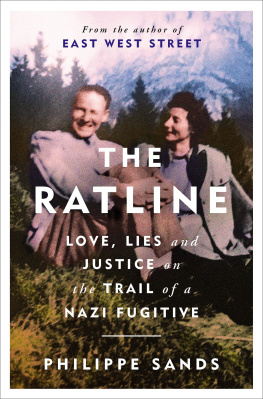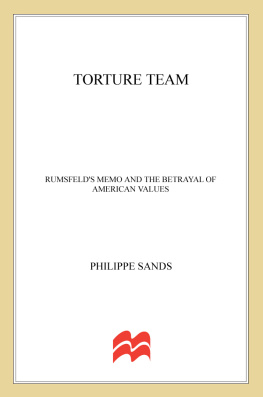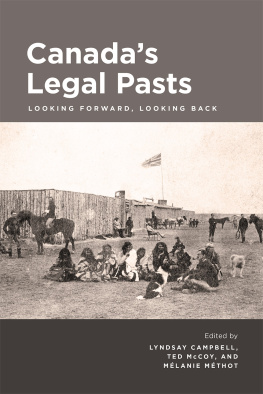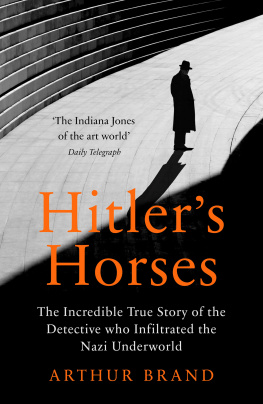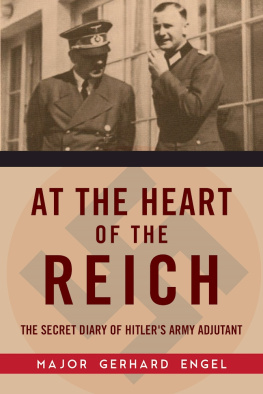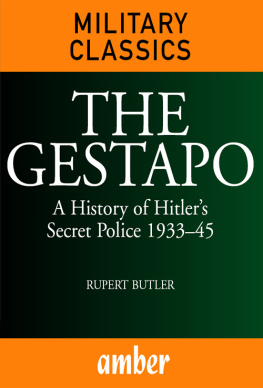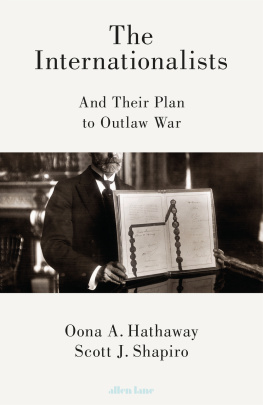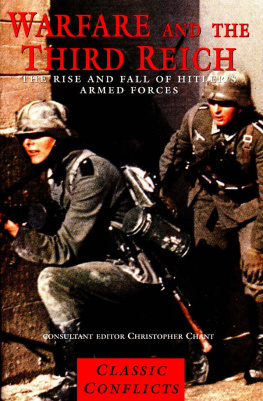Philippe Sands - East West Street
Here you can read online Philippe Sands - East West Street full text of the book (entire story) in english for free. Download pdf and epub, get meaning, cover and reviews about this ebook. year: 2016, publisher: W&N, genre: Non-fiction. Description of the work, (preface) as well as reviews are available. Best literature library LitArk.com created for fans of good reading and offers a wide selection of genres:
Romance novel
Science fiction
Adventure
Detective
Science
History
Home and family
Prose
Art
Politics
Computer
Non-fiction
Religion
Business
Children
Humor
Choose a favorite category and find really read worthwhile books. Enjoy immersion in the world of imagination, feel the emotions of the characters or learn something new for yourself, make an fascinating discovery.
- Book:East West Street
- Author:
- Publisher:W&N
- Genre:
- Year:2016
- Rating:3 / 5
- Favourites:Add to favourites
- Your mark:
- 60
- 1
- 2
- 3
- 4
- 5
East West Street: summary, description and annotation
We offer to read an annotation, description, summary or preface (depends on what the author of the book "East West Street" wrote himself). If you haven't found the necessary information about the book — write in the comments, we will try to find it.
East West Street — read online for free the complete book (whole text) full work
Below is the text of the book, divided by pages. System saving the place of the last page read, allows you to conveniently read the book "East West Street" online for free, without having to search again every time where you left off. Put a bookmark, and you can go to the page where you finished reading at any time.
Font size:
Interval:
Bookmark:
ALSO BY PHILIPPE SANDS
Books
Torture Team
Lawless World
Principles of International Environmental Law
Justice for Crimes Against Humanity (ed.)
From Nuremberg to The Hague (ed.)
Bowetts Law of International Institutions
Film
What Our Fathers Did: A Nazi Legacy
Performance
A Song of Good and Evil


Genocide in the handwriting of Rafael Lemkin, ca. 1945, and Crimes against humanity, Hersch Lauterpacht, July 1946.




THIS IS A BORZOI BOOK
PUBLISHED BY ALFRED A. KNOPF
Copyright 2016 by Philippe Sands
All rights reserved. Published in the United States by Alfred A. Knopf, a division of Penguin Random House LLC, New York, and distributed in Canada by Random House of Canada, a division of Penguin Random House Canada Limited, Toronto.
www.aaknopf.com
Knopf, Borzoi Books, and the colophon are registered trademarks of Penguin Random House LLC.
Library of Congress Control Number: 2016933268
ISBN 978-0-385-35071-6 (hardcover)
ISBN 978-0-385-35072-3 (ebook)
Cover photograph by Darren Alff
Cover design by Janet Hansen
Maps by International Mapping, Ellicott City, Maryland
eBook ISBN9780385350723
v4.1_r1
a
For Malke and Rosa,
for Rita and Leon,
for Annie,
for Ruth
The little town lies in the middle of a great plainIt begins with little huts and ends with them. After a while the huts are replaced by houses. Streets begin. One runs from north to south, the other from east to west.
JOSEPH ROTH , The Wandering Jews, 1927
What haunts are not the dead, but the gaps left within us by the secrets of others.
NICOLAS ABRAHAM , Notes on the Phantom, 1975
The city of Lviv occupies an important place in this story. Through the nineteenth century, it was generally known as Lemberg, located on the eastern outskirts of the Austro-Hungarian Empire. Soon after World War I, it became part of newly independent Poland, called Lww, until the outbreak of World War II, when it was occupied by the Soviets, who knew it as Lvov. In July 1941, the Germans unexpectedly conquered the city and made it the capital of Distrikt Galizien in the General Government, known once more as Lemberg. After the Red Army vanquished the Nazis in the summer of 1944, it became part of Ukraine and was called Lviv, the name that is generally used today. Exceptionally, if you fly to the city from Munich, the airport screens identify the destination as Lemberg.
Lemberg, Lviv, Lvov, and Lww are the same place. The name has changed, as has the composition and nationality of its inhabitants, but the location and the buildings have remained. This is even as the city changed hands, no fewer than eight times in the years between 1914 and 1945. What to call the city in the pages of this book posed a number of difficulties, so I have used the name by which it was referred to by those who controlled it at the time of which I am writing. (I generally adopt the same approach for other places: nearby kiew is now Zhovkva, after an interregnum from 1951 to 1991, when it was called Nesterov in honor of a Russian World War I hero, the first pilot to fly a loop.)
I thought of calling it Lemberg throughout, because the word evokes a gentle sense of history, as well as being the city of my grandfathers childhood. Yet such a choice could be taken as sending a signal, which might cause offense to others, all the more unfortunate at a time when the territory of Ukraine is being fought over with Russia. The same went for the name Lww, which it was called for two decades, and also for Lviv, which had been the name of the city for just a few tumultuous days in November 1918. Italy never controlled the city, but if it had, it would be called Leopolis, the City of Lions.
Hersch Lauterpacht, professor of international law, was born in August 1897 in the small town of kiew, a few miles from Lemberg, to which the family moved in 1911. The son of Aron and Deborah (ne Turkenkopf), he was the second of three children, between his brother, David, and his sister, Sabina. In 1923, he married Rachel Steinberg in Vienna, and they had one son, Elihu, who was born in Cricklewood, London.
Hans Frank, a lawyer and government minister, was born in Karlsruhe in May 1900. He had two brothers, one older and one younger. In 1925, he married Brigitte (ne Herbst), and they had two daughters and three sons, the last of whom was named Niklas. In August 1942, he spent two days in Lemberg, where he delivered several speeches.
Rafael Lemkin, a prosecutor and lawyer, was born in Ozerisko near Biaystok, in June 1900. The son of Josef and Bella, he had two brothers (the older, Elias, and the younger, Samuel). In 1921, he moved to Lww. He never married and had no children.
My grandfather Leon Buchholz was born in Lemberg in May 1904. The son of Pinkas, educated as a distiller of spirits and later an innkeeper, and Malke (ne Flaschner), he was the youngest of four children, after his older brother, Emil, and two sisters, Gusta and Laura. He married Regina Rita Landes in Vienna in 1937, and a year later their daughter, Ruth, who is my mother, was born there.


TUESDAY, OCTOBER 1, 1946,
NUREMBERGS PALACE OF JUSTICE
A LITTLE AFTER three oclock in the afternoon, the wooden door behind the defendants dock slid open and Hans Frank entered courtroom 600. He wore a gray suit, a shade that was offset by the white helmets worn by the two somber-faced military guards, his escorts. The hearings had taken a toll on the man who had been Adolf Hitlers personal lawyer and then personal representative in German-occupied Poland, with his pink cheeks, sharp little nose, and sleeked-back hair. Frank was no longer the slender and swank minister celebrated by his friend Richard Strauss. Indeed, he was in a considerable state of perturbation, so much so that as he entered the room, he turned and faced the wrong direction, showing his back to the judges.
Sitting in the packed courtroom that day was the professor of international law at Cambridge University. Balding and bespectacled, Hersch Lauterpacht perched at the end of a long wooden table, round as an owl, flanked by distinguished colleagues on the British prosecution team. Seated no more than a few feet from Frank, in a trademark black suit, Lauterpacht was the one who came up with the idea of putting the term crimes against humanity into the Nuremberg statute, three words to describe the murder of four million Jews and Poles on the territory of Poland. Lauterpacht would come to be recognized as the finest international legal mind of the twentieth century and a father of the modern human rights movement, yet his interest in Frank was not just professional. For five years, Frank had been governor of a territory that included the city of Lemberg, where Lauterpacht had a large family, including his parents, a brother and sister, their children. When the trial had opened a year earlier, their fate in the kingdom of Hans Frank was unknown.
Font size:
Interval:
Bookmark:
Similar books «East West Street»
Look at similar books to East West Street. We have selected literature similar in name and meaning in the hope of providing readers with more options to find new, interesting, not yet read works.
Discussion, reviews of the book East West Street and just readers' own opinions. Leave your comments, write what you think about the work, its meaning or the main characters. Specify what exactly you liked and what you didn't like, and why you think so.

